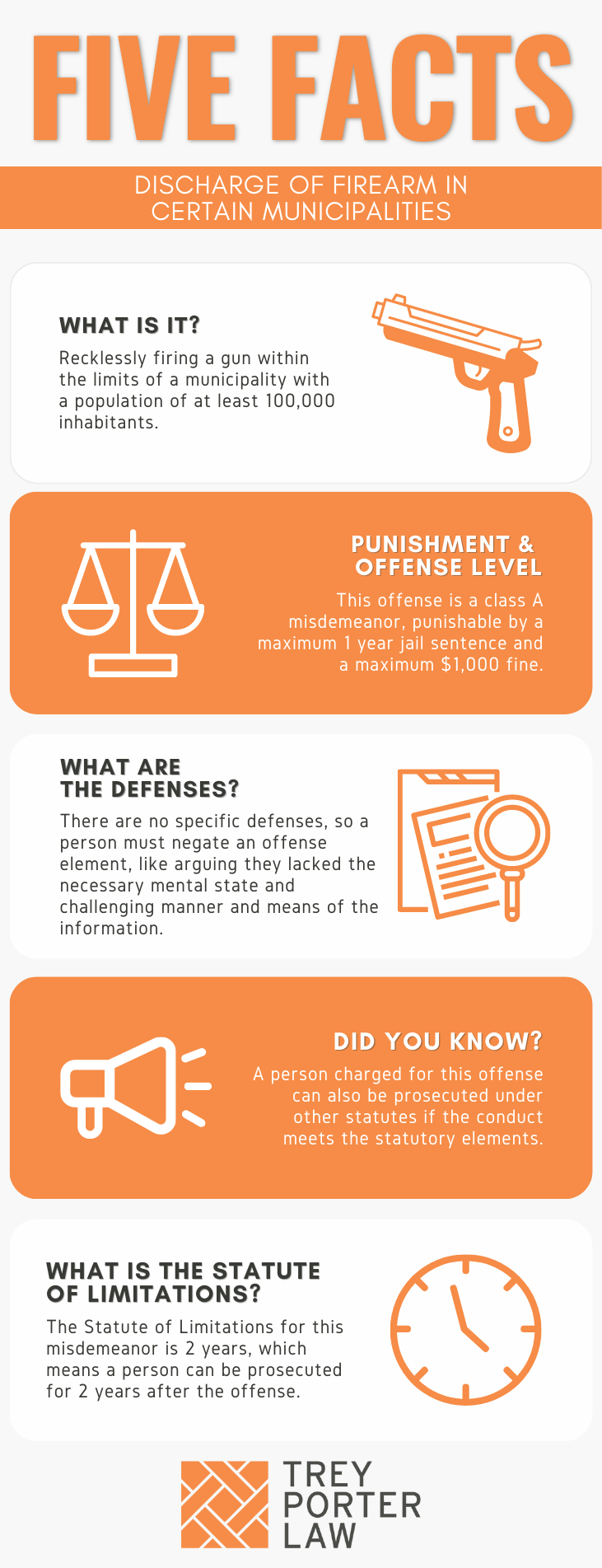WHAT IS DISCHARGE OF FIREARM IN CERTAIN MUNICIPALITIES IN TEXAS?
The Texas law against discharging a firearm in certain municipalities prohibits firing a gun within city limits, if the city’s population is at least 100,000 people.

WHAT IS THE DISCHARGE OF FIREARM IN CERTAIN MUNICIPALITIES LAW IN TEXAS?
Tex. Penal Code § 42.12. DISCHARGE OF FIREARM IN CERTAIN MUNICIPALITIES.
(a) A person commits an offense if the person recklessly discharges a firearm inside the corporate limits of a municipality having a population of 100,000 or more.
(b) An offense under this section is a Class A misdemeanor.
(c) If conduct constituting an offense under this section also constitutes an offense under another section of this code, the person may be prosecuted under either section.
(d) Subsection (a) does not affect the authority of a municipality to enact an ordinance which prohibits the discharge of a firearm.
WHAT IS THE PENALTY CLASS FOR DISCHARGE OF FIREARM IN CERTAIN MUNICIPALITIES IN TEXAS?
Discharging a firearm within city limits is a Class A misdemeanor, punishable by up to one year in county jail.
WHAT IS THE PUNISHMENT RANGE FOR DISCHARGE OF FIREARM IN CERTAIN MUNICIPALITIES IN TEXAS?
Discharging a firearm in certain municipalities, a Class A misdemeanor, carries a possible jail sentence of up to one year, and a maximum fine of $4,000.
WHAT ARE THE PENALTIES FOR DISCHARGE OF FIREARM IN CERTAIN MUNICIPALITIES IN TEXAS?
A person charged with discharging a firearm in certain municipalities may be eligible for probation after a conviction, or deferred adjudication without a conviction, for a maximum period of two years.
WHAT ARE THE DEFENSES TO DISCHARGE OF FIREARM IN CERTAIN MUNICIPALITIES IN TEXAS?
The State must allege in the information, or charging instrument, the specific acts of recklessness. The most common defense to discharging a firearm within city limits is to negate the alleged mental state, whether through a pre-trial motion to quash the information, or during trial before a jury.
- What are examples of reckless discharge of a firearm in Texas? Texas Penal Code Section 6.03 explains a person is criminally reckless “when he is aware of but consciously disregards a substantial and unjustifiable risk,” which “constitutes a gross deviation from the standard of care that an ordinary person would exercise under all circumstances as viewed from the actor’s standpoint.”In the context of discharging a firearm within densely-populated city limits, a person acts with criminal recklessness if there is a substantial likelihood of shooting a nearby person or thing of value.For example, firing shots into the air in an apartment complex parking lot could be considered reckless, given the possible presence of residents in the immediate vicinity. Firing shots directly into a crowd is reckless, and fits the felony charge of deadly conduct, or even aggravated assault with a deadly weapon, depending on the circumstances.
WHAT IS THE STATUTE OF LIMITATIONS FOR DISCHARGE OF FIREARM IN CERTAIN MUNICIPALITIES IN TEXAS?
The limitation period for discharge of a firearm in certain municipalities, a Class A misdemeanor, is two years.
DISCHARGE OF FIREARM IN CERTAIN MUNICIPALITIES IN TEXAS
Texas law criminalizes discharging a firearm in densely populated cities, with the goal of reducing accidental shootings of bystanders.
TEXAS DISCHARGE OF FIREARM IN CERTAIN MUNICIPALITIES COURT CASES
The case law regarding discharge of a firearm in certain municipalities in Texas shows the necessity of specifically alleging how a person was reckless.
- In State v. Rodriguez, the State alleged the defendant recklessly discharged a firearm within city limits “by pulling the trigger on a firearm which contained ammunition and was operable.” The trial court and the court of appeals held the information was defective because it failed to allege recklessness.The Texas Court of Criminal Appeals agreed, holding this charging language pled a tautology: “The defendant recklessly discharged a firearm because he discharged a firearm.” If that were the standard, people could be punished for shooting a robber coming into their home, or a rattlesnake lying in the bushes, which are not reckless under the statute.
















